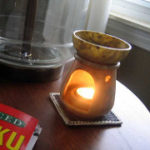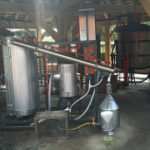Aromatherapy essential oils are the highly concentrated essences of aromatic plants. The oils are found in different parts of the plant such as the flowers, twigs, leaves and bark, or in the rind of fruit. For example, in roses it is found in the flowers, in basil it is in the leaves, in sandalwood in the wood, and so on.
Essential oils have numerous uses but one of the most popular today is aromatherapy. Each of the organic essential oils used in aromatherapy can be used either alone or in combination to create a desired effect. Before using pure essential oils as part of an aromatherapy treatment, it is important to understand the effect that the oil(s) have, and how aromatherapy works.
Aromatherapy is the art of using these oils to promote healing of the body and the mind. The methods used to extract the oils are time consuming, expensive and require a high degree of expertise. Organic essential oils can be extracted using a variety of methods, although some are not commonly used today. Currently, the most popular method for extraction is steam distillation. To extract the essential oil, the plant material is placed into a still (very similar to a pressure cooker) where pressurized steam passes through the plant material. The heat from the steam causes globules of oil in the plant to burst and the oil then evaporates. The essential oil vapor and the steam then pass out the top of the still into a water cooled pipe where the vapors are condensed back to liquids. At this point, the essential oil separates from the water and floats to the top. This is a process best left to professionals.
Did you realize that it takes in excess of 220 pounds of rose petals to produce only 4 or 5 teaspoonfuls of oil? Did you know that it takes more than 8 million jasmine flowers to produce just 2 pounds of jasmine essential oil? Due to the large quantity of plant material required, pure essential oils are expensive but they are also highly effective. Only a few drops at a time are required to achieve desired effects. Diffuse these oils in electric or tea light oil burners.
How Essential Oils Work
Essential oils have an immediate impact on our sense of smell, also known as “olfaction”. When essential oils are inhaled, olfactory receptor cells are stimulated and the impulse is transmitted to the emotional center of the brain, or “limbic system”. The limbic system is connected to areas of the brain linked to memory, breathing, and blood circulation, as well as the endocrine glands which regulate hormone levels in the body. The properties of the oil along with the fragrance and its effects determine stimulation of these systems.
When essential oils are used in massage oils, they are not only inhaled, but absorbed through the skin as well. They penetrate the tissues and find their way into the bloodstream where they are transported to the organs and systems of the body. Since essential oils have differing rates of absorption, generally between 20 minutes and 2 hours, it is not recommended to bathe or shower directly following a massage to ensure maximum absorption and effectiveness.
Different essential oils product different effects on the nervous system such as energizing, calming, soothing, headache reliever, balancing, insomnia, etc. Let’s look specifically at the oils that are noted to promote reducing stress.
Amber essential oil is known for producing harmony, balance and providing a calming effect on the body.
Basil essential oil is soothing.
Basil Holy essential oil is best known for anti-stress.
Bergamot essential oil balances the mind and increases a sense of well being.
Chamomile Blue essential oil is relaxing and soothing.
Clary Sage essential oil is famous for its ability to calm and relax the mind and muscles.
Jasmine essential oil is relaxing and provides restful sleep.
Lavender (French) essential oil is a must for relaxing and calming.
Lime essential oil clears the mind and eliminates emotional confusion.
Mandarin Red essential oil is best for relieving stress, tension, insomnia and anxiety.
Myrrh essential oil can be attributed to calming nerves and fostering tranquility.
Palmarosa essential oil is acclaimed as a stress reliever. It also clears the mind and calms the senses.
Rosemary essential oil calms apprehension while stimulating the spirit.
Rosewood essential oil may help relieve tiredness, nervousness and stress.
Tangerine essential oil can help relieve stress and tension due to the soothing action on the nervous system.
Thyme essential oil calms the nervous system and reduces anxiety and stress.
While no one will make definitive medicinal claims regarding essential oils, aromatherapy has been practiced for centuries with results that demand notice. Many essential oils can be used in an aroma oil burner, blended with carrier oils, blended with bath and body products, or in a warm bath. Since the essentials are a pure oil warnings should always be heeded.
The next time your busy schedule has found you with stress that you would like to relieve try nature’s remedy – essential oils.
This article can be freely published on a website as long as it’s not modified in any way including the author bylines. In addition, the hyperlink must be made active just like below.
Erin Torres is the co-owner of Aroma Isle. Experience Aroma Isle ~ We have a fragrance for every memory.
Visit our Essential Oils [http://aromaisle.com/essential-oils.html] website.
Article Source:
http://EzineArticles.com/expert/Erin_Torres/109620










Leave a reply